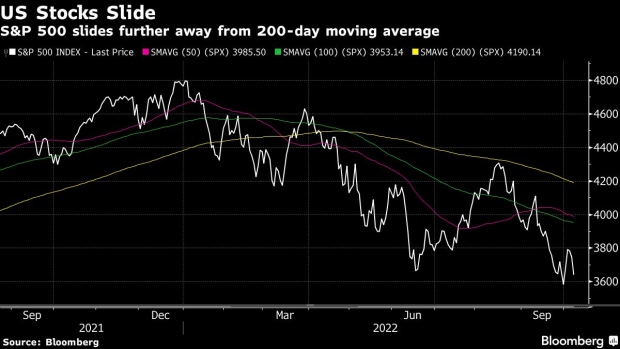Oct 9, 2022
Asian Stocks Set to Decline as Rate-Hike Bets Firm: Markets Wrap
, Bloomberg News

(Bloomberg) -- US stocks fell for a fourth day as prospects for policy tightening and geopolitical risks weighed on investor sentiment. A gauge of dollar strength rose to the highest level this month.
The S&P 500 ended off lows in a choppy afternoon session that saw the benchmark almost reverse losses of more than 1%, before selling pressure gathered pace in the final minutes of trading. The Nasdaq 100 underperformed, with semiconductors among the worst performers after Washington’s move to further restrict China’s access to US technology added to signs of slowing chip demand worldwide.
The pullback from the day’s low came after Federal Reserve Vice Chair Lael Brainard laid out a case for caution, noting that previous rate increases were still working through the economy. Earlier, Chicago Fed President Charles Evans said the Fed needs to quickly get to a level where policy makers can feel comfortable pausing in order to reduce the risk of overshooting. Treasury futures traded lower, while the US cash market was closed for Columbus Day.
The dollar rose against almost all of its major counterparts amid signs of a new escalation in the Russia-Ukraine war. In the UK, turbulence gripped the gilt market, with the selloff accelerating despite the Bank of England extending its emergency backstop measures.
The mood remains fragile ahead of Thursday’s US inflation data and a raft of bank earnings that will kick off the third-quarter season in earnest. A hotter-than-expected inflation reading, coming on top of last week’s strong labor print, will heap pressure on the Fed to extend 75 basis-point rate hikes beyond this year.
“Inflation and the Fed should dominate this week,” wrote Paul Nolte, portfolio manager at Kingsview Investment Management. “If the discussion of higher rates remains front and center, the markets are likely to stay on their heels.”
Relentlessly hawkish central banks are making investors gloomy about the upcoming earnings season. JPMorgan Chase & Co. and Citigroup Inc. are among the big banks that will unveil earnings later this week.
“The market right now is trying to digest all this data coming in and then put it alongside some sort of Fed rate-hike path,” Shawn Cruz, head trading strategist at TD Ameritrade, said in an interview at Bloomberg’s New York headquarters. “And every time you get something that comes in not in the absolute rosy potential outcome for that data point, the market has some pretty big jitters. With the opening salvo from the earnings season coming from the banks, that’s going to drive a lot of volatility.”
Even after this year’s brutal selloff, markets have not priced all the risks stemming from higher interest rates and stubbornly high inflation. More than 60% of the 724 respondents to Bloomberg’s latest MLIV Pulse survey predicted the earnings season would push the S&P 500 Index lower. Strategists at Goldman Sachs Group Inc. and Morgan Stanley warned it would be a difficult reporting season, given risks such as slowing demand and soaring costs
“The bear market will not be over until the deteriorating fundamental picture is more fully discounted,” Morgan Stanley strategists told clients.
On the corporate front:
- Automakers Ford Motor Co. and General Motors Co. tumbled as the industry outlook darkened further with at least two Wall Street analysts predicting earnings will fall steeply next year.
- Macau casino operators including Wynn Resorts Ltd. and Las Vegas Sands Corp. tumbled in US trading after data showed that tourism revenue fell sharply over China’s week-long National Day break.
- Rivian Automotive Inc. declined after the electric-vehicle maker said it will recall about 13,000 vehicles it delivered to customers after discovering a minor structural defect.
Meanwhile, Britain stepped up efforts to support market functioning. The BOE extended emergency measures backing the bond market through early next month while Chancellor of the Exchequer Kwasi Kwarteng brought forward the date at which he will deliver his much-awaited fiscal strategy.
Despite the measures, 30-year borrowing costs rose above 4.5%. The pound fell for a fourth day.
Key events this week:
- Earnings this week include: JPMorgan Chase & Co., Citigroup Inc., Morgan Stanley, BlackRock Inc., Delta Air Lines Inc., UnitedHealth Group Inc., U.S. Bancorp, Wells Fargo & Co.
- IMF’s World Economic Outlook and Global Financial Stability Report, Tuesday
- Fed’s Loretta Mester speaks, Tuesday
- BOE’s Andrew Bailey speaks, Tuesday
- FOMC minutes for September meeting, Wednesday
- US PPI, mortgage applications, Wednesday
- OPEC Monthly Oil Market Report, Wednesday
- Fed’s Michelle Bowman and Neel Kashkari speak
- ECB’s Christine Lagarde speaks
- US CPI, initial jobless claims, Thursday
- G-20 finance ministers and central bankers meet, Thursday
- China CPI, PPI, trade, Friday
- US retail sales, business inventories, University of Michigan consumer sentiment, Friday
- BOE emergency bond buying is set to end, Friday
Some of the main moves in markets:
Stocks
- The S&P 500 fell 0.7% as of 4 p.m. New York time
- The Nasdaq 100 fell 1%
- The MSCI World index fell 1%
Currencies
- The Bloomberg Dollar Spot Index rose 0.3%
- The euro fell 0.4% to $0.9703
- The British pound fell 0.3% to $1.1057
- The Japanese yen fell 0.3% to 145.72 per dollar
Cryptocurrencies
- Bitcoin fell 1.4% to $19,212.65
- Ether fell 1% to $1,307.48
Bonds
- Germany’s 10-year yield advanced 15 basis points to 2.34%
- Britain’s 10-year yield advanced 23 basis points to 4.47%
Commodities
- West Texas Intermediate crude fell 2% to $90.80 a barrel
- Gold futures fell 2% to $1,675.20 an ounce
©2022 Bloomberg L.P.





